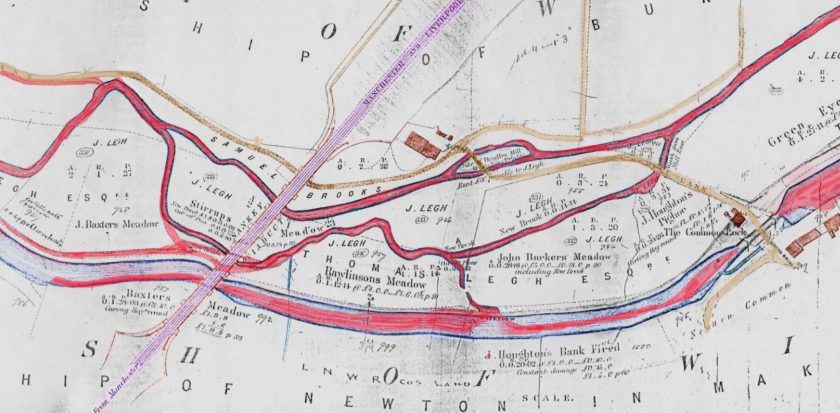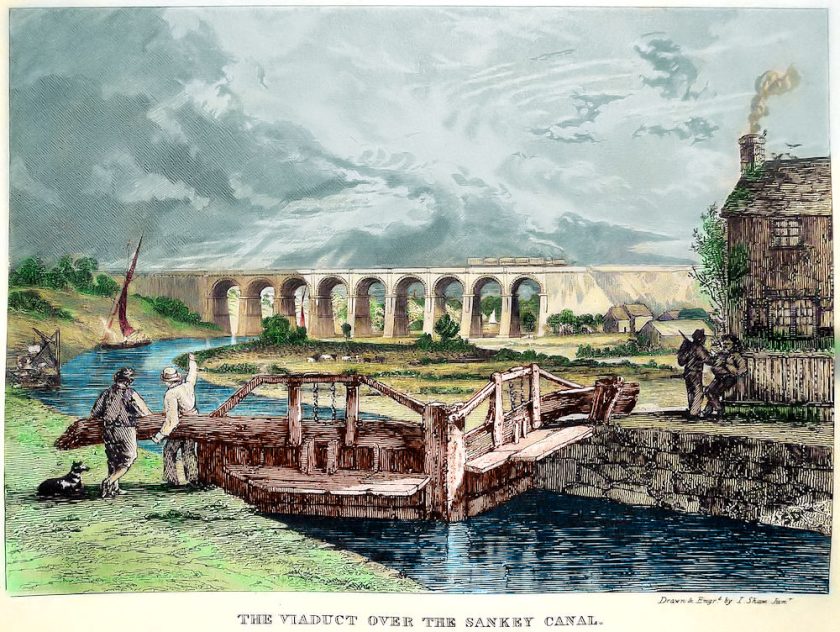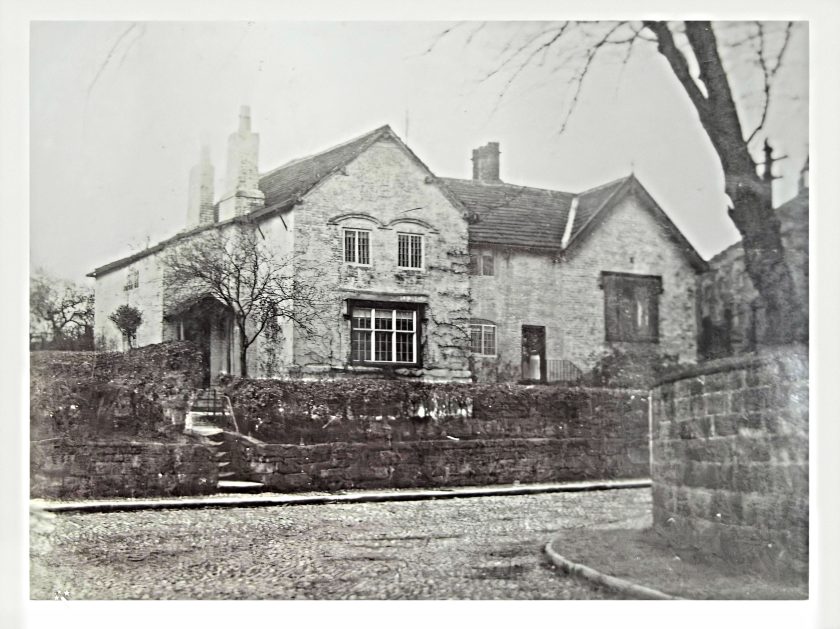Today I managed to transcribe some poems written by J H Lane, which he published in 1916 in a small 40 page booklet called “Newton le Willows – Pictures and Verse”.
Most of the Pictures from the book have already made it into the photo gallery, as they duplicate ones in his other two publications, as do some of the verse from the book, but here are three small sections of verse which are new to me.
A Sad Mishap.
PRELUDE.
Near Castle Hill, that ancient mound
Whose top with withered oaks is crowned.
There stands a bridge, of wood its make,
That spans an artificial lake.
THE MISHAP.
Towards this bridge, one Sabbath-day,
Three Newton swains did wend their way,
In Sunday suits attired,
In hopes to see some maidens fair,
Who often had resorted there–
For what, Ive neer enquired.
Around their eager eyes they turn,
But not a maid can they discern
On this side or on that;
So on the bridge, with many a yell,
They rush and now the Muse will tell
Of a sad mishap which there befell
A certain tall silk hat.
To soothe their disappointment sore,
These swains begin a-jumping oer
This bridge upheld by stumps.
The first two jump the bridge in six,
The third, by swinging long and kicks,
Gets over in five jumps.
Then the owner of a “shiner”
(Not a common “four-and-niner”)
Shouts out with might and main:
“0 lads! as sure as Im alive,
I will get oer this bridge in five,
So here I go again”
He pulls his hat down oer his ears,
And soon in attitude appears
Knees bent and arms outspread;
Anon a mighty jump he takes,
Which shakes the bridge, and also shakes
The hat from off his head.
To save his hat from falling down
Upon the bridge, which might the crown
Indent or break the brim,
Some frantic struggles he doth make,
And also makes a sad mistake,
For soon upon the rippled lake
His “chimney-pot” doth swim.
Bare headed now, with clasped hands,
Upon the bridge the owner stands,
So sad and so distressed;
And, having watched his hats descent,
His feelings then in words give vent,
Which words composed this sad lament,
To his tall hat addressed:-
THE OWNERS LAMENT, AND THE HATS REPLY.
” 0 HAT! 0 hat! my Sunday hat!
Pray tell, in accents clear,
Why thou hast left thy resting-place
To sail on Newton Mere!
Tis true that Ive not used thee well,
For oft Ive let thee fall;
But, why thou shouldst turn mariner,
I cant make out at all.
“What would thy honest maker say
To see thy sorry plight?
Im sure hed rave most terribly,
And swear that thou wast tight!”
A gust of wind came thro the bridge,
And turned the tall hat oer;
Then, thro its ventilator, came
This verse?and nothing more :-
“My brim is hard, my crown is tough;
I blame thee not for usage rough
Ay, many a bump and thump!
But this Id have thee understand,
That, in the Book so rarely scanned,
Thourt bid remember this command ?
This day thou shalt not jump!
Another gust came thro the bridge,
The hat turned oer again,
At which its owner cried aloud,
As smit with sudden pain :-
“Will no one save my hat for me
Before it disappears?”
Upsprang his friend, and, smiling, said
“I will!” which stopped his tears.
THE RESCUE.
Fast to the rescue his friend now rushes,
Thro nettles, ferns, and blackberry-bushes,
To where a small boat lay chained by a stage;
But, when he got there, he fell into a rage,
For the boat was locked, and he had no key;
So he raises his foot, and smashes a tree,
Which loosens the chain; then jumps in the boat,
Takes off his hat, and throws off his coat,
Rolls up his shirt-sleeves, then grippeth the oars,
And soon, with exertion, sweat down him pours.
A voice of wailing now conies from the shore,
“Be quick! be quick! or my hat is no more!”
The cry is heard, and, in less than a minute,
Uprushes the boat with the lad who is in it,
Who rescues the hat from a watery fate,
And restores it, all wet, to its owners pate.
Then the owner raises his musical voice,
And shouteth aloud, “Rejoice! 0 rejoice!
For my tall hat a watery fate bath braved:
So rejoice with me, friends, that my hat is saved!”
A Newton Pastoral.
NIGHTS spangled curtain is withdrawn;
Fair Nature smileth thro her tears,
For brightly beauteous beamed the dawn,
And now the glorious day appears.
The owl hath long regained her home;
The blinking bats, the barns and ricks;
And, from the churchs little dome,
The village clock proclaimeth six.
The prostrate cattle low their thanks;
For balmy rest, and, as I pass,
They rise and shake their steaming flanks,
And, eager, graze the moistened grass.
The leas are dotted oer with lambs
That frisk about with happy bleat,
Or, crowding round their patient dams,
Draw sweetness from the yielding teat.
The waters breezy bosom heaves,
The flowers have oped their dewy eyes,
The trees have dried their shady leaves,
And larks, exulting, seek the skies.
The thrushes and the linnets sing,
The robins and the sparrows pipe,
The joyous bees are on the wing,
And lakeward darts the lonely snipe.
The rabbit crops the tender sprout,
The water-hen her journey plies,
The pike prepares to seize the trout,
The trout outleaps to catch the flies.
The water-rat sniffs round the edges
To find the fishers fallen food,
The wagtail darts among the sedges,
The duck escorts her yellow brood.
With arched wings, the graceful swans
Pursue the ducks, with jealous eyes,
As though the proud and selfish ones
Would all the mere monopolize.
The dusky martins cleave the air,
And, as they chase the butterfly,
Their faultless sight and flight declare
The gaily-painted pet must die.
They tunable from the giddy height,
And, skimming, oer the surface go,
Yet stoop, amid their rapid flight,
To greet the birds they spy below,
And gnats, in ever-widening rings,
Disport them in the sunny rays,
Until the swish of swallows wings
Scatters their armies in amaze.
The breezes skim along the lake,
Rippling its sunbeam-burnished breast,
And playfully the rushes shake,
Rocking the widgeon in her nest,
They press the clover-sprinkled grass,
Which undulates in shady swells,
And, sweetly whispering, onward pass
To toss the odour-freighted bells
Of hyacinths that clothe the banks
In robes of green and skies- blue,
And leave them, nodding on their shanks,
The modest primroses to woo.
They breathe about their tender stems,
Uplift their petals towards the sky,
And whispering low, “Ye pretty gems I”
A-rustling thro the bracken hie;
And fan the little feathery fern
that in the mossy cranny dwells,
The stately foxgloves backward turn,
Tossing the bees within their bells.
They circle round the sturdy oaks.
And make their apples dance with;lee,
And, fondly kissing, gently coax
The very leaves to harmony.
The sun bath journeyed on an hour
Athwart the silver plains of heaven,
And, from the churchs little tower,
The village clock proclaimeth seven.
The Wanderers Return.
Tune?”Believe me, if all those endearing young charms.”
the second part repeated for Chorus.
HAIL! Newton-le-Willows, the place I love best,
With emotion a native beholds thee,
And gratefully welcomes thy haven of rest,
To enjoy the blest calm that enfolds thee.
Neer again shall I wander, for blessings in store,
In His bounty, my God hath provided;
And thy youth-haunted scenes are as dear as of yore,
Ere misfortune my parting decided.
CHORUS.
I have travelled afar, and beheld with delight
The fair towns of the Gaul and the Teuton,
But the dearest on earth is the place of my birth,
The “Sweet Auburn” of Lancashire?Newton
All hail! shady trees, and thou breeze-rippled lake,
Where we gathered for frequent immersion,
And, strangers to care, made the echoes awake
In the joy of our youthful diversion;
On thy bank is the hill where my Mary and I
Sat at eve, while the pigeons were cooing
In the branches above, and, sore smitten with love,
There I first felt the rapture of wooing.
And all hail! to the church I attended in youth
For its hearty and true adoration,
And to list to the parson expounding the Truth
With conviction and earnest persuasion;
In thy shade are the graves where my forefathers sleep,
And the maid of my deepest affection,
And the friends of my youth, whom my memory will keep
Ever worthy of fond recollection.
Hail! Newton-le-Willows, the place I love best,
May these kindly impressions neer leave me,
Until with my kindred Im gathered to rest,
And the quiet churchyard shall receive me ;
And there may the flower-sprinkled grass oer me wave,
While the lark trills his carol above me,
And my nearest and dearest repair to my grave
To show by remembering they love me!
Transcribed by Steven Dowd from the 1916 publication, “Newton le Willows – Pictures and Verse” by J H Lane for use in the Newton-le-Willows website ©2005


